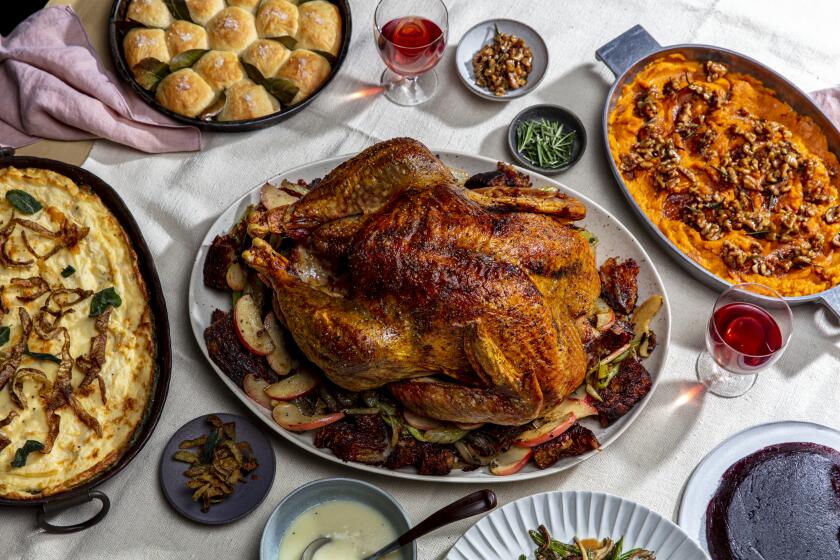4th Generation Works to Preserve Family Tradition of Good Taste
E. Waldo Ward & Son is an unexpected world of gourmet smells.
Cloves, cinnamon and ginger scents rose from an antiquated electric grinder where Jeffrey Ward, 24, worked on a recent morning in Sierra Madre. In two stainless-steel kettles, sliced circles of onions topped a steaming meat sauce made from a family recipe.
Next to another 100-gallon kettle, Jeffreyâs father, Richard, 55, used a long spatula to stir a stewing batch of Oregon red raspberries.
Two women spooned nine-ounce portions of mango chutney, taken from barrels shipped from Bombay, into jars. A vinegary smell wafted from tubs of green olives, imported from Spain.
Among the large lots and big houses on East Highland Avenue in this tiny town hard against the San Gabriel foothills, Waldo Ward & Son, in a rambling warehouse beside a Victorian house and red barn, is hardly noticeable.
For 99 years, the Wards have been canning and preserving oranges, kumquats and other fruits and condiments. Much of the produce is grown on Ward land in the San Gabriel Valley.
Today, three generations of Ward men operate the business from the three-acre plot where the homestead and barn were built in 1903. The recipes are time-tested, many of them gathered by the founder, the late E. Waldo Ward Sr., who took lengthy trips selling gourmet food around the West in the early part of this century.
âWe donât give a damn about volume,â said Jeffreyâs grandfather, 87-year-old E. Waldo Ward Jr. âWe give a damn about quality product.â
Jeffrey said: âWe have a niche, selling to people who want better quality. Thatâs where we come in, like a Rolls-Royce.â
Waldo, Richard and Jeffrey: Each proudly speaks of following in his fatherâs footsteps and of being firmly planted in Sierra Madre. The three bachelors (Waldoâs wife died in 1971, and Richard was divorced 10 years ago) live together in the Victorian house.
âThere isnât another place like it in Sierra Madre where you have the same family living on a place for four generations,â Richard said.
Ask Waldo, a Pomona College chemistry major in the 1920s, why he never left Sierra Madre, and he will look at you as if youâre crazy to suggest he might have.
Ask Richard, who graduated from UC Davis with a degree in agricultural economics in 1957, and he acknowledges that he wasnât sure that he would uphold the tradition. In fact, he worked six years for Del Monte Foods Inc. in the Bay Area. But he said he found that âwhen you work for a large company, you just feel like youâre a smaller cog in the works.â
Ask Jeffrey, Richardâs only son (his two daughters arenât affiliated with the business), and he says he wanted to work in the family firm since he was 12. He majored in food science and technology at UC Davis.
In an office cluttered with everything from the mounted skin of a diamondback rattlesnake killed in the groves to black-and-white photographs of himself as a boy, Waldo Jr. held forth on his marmalade birthright.
Waldo Sr., he said, developed tuberculosis when he worked for a New York fancy foods company and in 1887 headed west for drier air. He eventually settled in Sierra Madre, then a mecca for tuberculosis patients.
He bought 10 acres for a house and orange groves, developed his own thriving marmalade line and shipped oranges back East by the crate. He even imported to Sierra Madre two trees from Seville, Spain, known for its tart oranges.
Ward obtained many of his recipes when, as a traveling salesman, he met women recently arrived from Great Britain, where they had worked in preserves factories. Now typed on 3-by-5 cards, the recipes still are used in the business, which employs two dozen workers during peak periods.
As business expanded--railway companies, for example, bought his British-style marmalade--he acquired more land. Wardâs preserves graced breakfast tables in Southern Pacific and Santa Fe dining cars and in railroad hotels at depots across the West.
Over the years, the Wards have sold groves to be subdivided, but they say they have no plans to sell out. Waldo Ward pointed to a computer and a fax machine--recent additions, thanks to his grandson, who wants to expand their mail-order business. Just last year, the firm began accepting credit cards.
Ward has filled orders for many California establishments, including Knottâs Berry Farm, Jurgensenâs Groceries and Pea Soup Andersenâs Restaurants. âIn the â20s,â he said, âwe used to sell to all the good stores in Boston and New York City.â
Outside, Richard Ward surveyed the palms, the fruit-heavy orange trees and the San Gabriel foothills to the north. He passed under a tin-roofed shed where the morning sun cured walnuts. As he headed in to finish a batch of red raspberry preserves, he said: âYou get spoiled living here.â
More to Read
Eat your way across L.A.
Get our weekly Tasting Notes newsletter for reviews, news and more.
You may occasionally receive promotional content from the Los Angeles Times.










